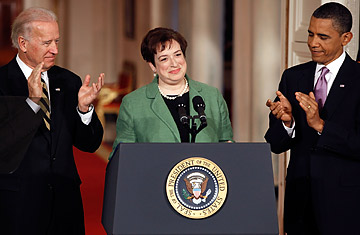
President Obama, with Vice President Biden, introduces Solicitor General Elena Kagan as his Supreme Court nominee
For the past half century, Americans have done a lot of hand-wringing over the racial, religious and gender make-up of the U.S. Supreme Court. You can pontificate about the need for open legal minds or strict adherence to the Constitution. But most of us, conservatives as well as liberals, believe that a diversity of backgrounds — the broad range of "empathy" that President Obama likes to gush about — does matter on the top bench.
So it's all the more confounding that Obama, who on Monday nominated Solicitor General Elena Kagan to replace retiring Justice John Paul Stevens, follows one of the most elitist traditions there is when it comes to selecting Supreme Court judges: tapping only people who attended law school at Harvard or Yale. The President, who last year chose Yale law graduate Sonia Sotomayor, had a wealth of candidates this time around who could have broken the tiresome Cambridge-New Haven mold: federal appeals judges Ann Claire Williams (Notre Dame) and Diane Wood (Texas), former Georgia Supreme Court chief justice Leah Ward Sears (Emory), Homeland Security Secretary Janet Napolitano (Virginia). Their law schools all rank in the nation's top 25. But Obama once again wrapped himself in Ivy and chose Kagan — a Harvard law grad just like himself.
Stevens, who got his J.D. at Northwestern University, is the only justice on the current court who doesn't bleed legal crimson or blue. (Justice Ruth Bader Ginsburg graduated from Columbia after transferring from Harvard Law.) So it seems well past time to ask: if the U.S. put women and minorities on the Supreme Court in the 20th century, shouldn't we in the 21st be concerned — as some in Congress now are — that our Presidents keep drawing from the same, ultra-exclusive law school well? Does their apparent obsession with the Harvard-Yale pedigree also risk undermining our high court's intellectual diversity and encourage the kind of elitism that's anathema to a democracy?
Harvardites and Yalies, pointing to grads like Sotomayor, argue that their schools have long been meritocracies. True enough. Still, powerful alumni like Obama tend to brandish them the way English lords flaunt the Oxford-Cambridge Old Boy network. "It's a perfectly incestuous academic cartel," says Jonathan Turley, a legal scholar and professor at the George Washington University School of Law (another top 25 school) who teaches a course on the Supreme Court. Turley notes that after Kagan's White House presentation, most of the breathless buzz from cable TV pundits was "how plugged in she is to that exclusive Harvard-Yale club, that she knows the other justices because of their law school associations. It's a self-replicating system."
But does it have a potentially harmful effect, not so different from a court once packed with old Wasp men (though if Kagan is confirmed, the court would no longer have any Protestants at all)? Scholars like Turley — who feels Kagan's output of legal writings is "wafer-thin" compared to those of candidates like Wood — think so. "It's deleterious to the court," he argues, "because it artificially limits the pool of candidates and inevitably removes better qualified candidates." The U.S. has the world's best legal education system, yet we turn to an absurdly minute corner of it for our Supreme Court justices. The high court is a cloistered enough institution as it is — so why risk making it even more detached from the rest of us by turning it into a Harvard-Yale Law Review reunion? "A court that draws from outside those two institutions," adds Turley, a Northwestern law grad, "would be part of a less insular conversation" in its deliberations.
Richard Garnett, a Yale law grad, clerk to the late Chief Justice William Rehnquist and professor at the University of Notre Dame's law school, agrees that "you do have to worry about missing opportunities for as broad a range of talent as possible, and that definitely includes people who went to Notre Dame or Texas or Virginia. Their best law students are just as good as those at Harvard or Yale." But he says Presidents tend to have Harvard and Yale on their SCOTUS brains because "those schools are extremely good at rigorous, deep thinking about the kind of legal questions that confront the justices." When it comes time to issue case rulings, Garnett argues, law schools aren't "something to worry about that much compared to how expertly justices decide legal questions and how well they understand the judge's role in a democracy."
Still, University of Texas School of Law professor and Supreme Court scholar Lucas Powe fears the court risks "an ignorance of certain parts of the law." He notes, for example, that the country's Sunbelt growth in recent decades has made water rights a more important area of case law, one that many top schools "west of I-95" tend to teach more thoroughly than northeastern schools. It's a reminder, says Powe, that the court today has "less geographical diversity than it did even when Thomas Jefferson was President."
Indeed, the Harvard-Yale bias may also contribute to another lingering Supreme Court imbalance. A geographic skew still exists: if Kagan is confirmed, only two of the nine justices, Chief Justice John Roberts and Clarence Thomas, will hail from somewhere other than the two coasts. (Four will be from New York City, two from California and one from New Jersey.) Obama, a Chicagoan, should understand as well as anyone that regional perspective can enrich a court's "empathy" as deeply as race, religion or gender. Stevens, also a Chicagoan, certainly understood it — which is why he fought so diligently as a justice against the kind of social elitism the President displayed again this week.
